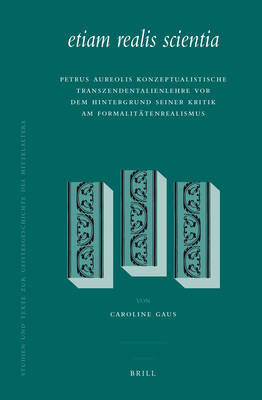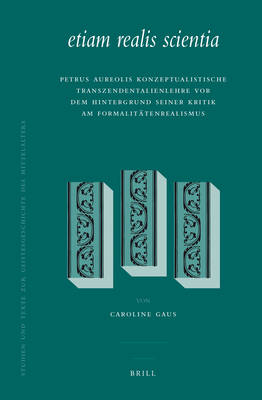
- Afhalen na 1 uur in een winkel met voorraad
- Gratis thuislevering in België vanaf € 30
- Ruim aanbod met 7 miljoen producten
- Afhalen na 1 uur in een winkel met voorraad
- Gratis thuislevering in België vanaf € 30
- Ruim aanbod met 7 miljoen producten
Zoeken
Omschrijving
Research on the medieval doctrine of the transcendentals is still characterized by one debate: its characteristic peculiarity vs. its structural correspondence to the modern concept of transcendentality. The present study on Peter Aureol's (+ 1322) doctrine of transcendentals offers a contribution to that discussion by delimiting from both directions: by developing Aureol's position in contrast to the contemporary position of a scotist-orientated, formalistic realism, it sheds light on the innovative traits in his doctrine. On the other hand, Aureol's logico-semantical revision of metaphysics is presented as an intentional affirmation of tradition, so that a revised view can be taken of Aureol's role within the development of a modern metaphysics of the object as such.
Specificaties
Betrokkenen
- Auteur(s):
- Uitgeverij:
Inhoud
- Aantal bladzijden:
- 314
- Taal:
- Engels
- Reeks:
- Reeksnummer:
- nr. 100
Eigenschappen
- Productcode (EAN):
- 9789004169722
- Verschijningsdatum:
- 22/08/2008
- Uitvoering:
- Hardcover
- Formaat:
- Genaaid
- Afmetingen:
- 160 mm x 240 mm
- Gewicht:
- 677 g

Alleen bij Standaard Boekhandel
+ 448 punten op je klantenkaart van Standaard Boekhandel
Beoordelingen
We publiceren alleen reviews die voldoen aan de voorwaarden voor reviews. Bekijk onze voorwaarden voor reviews.








